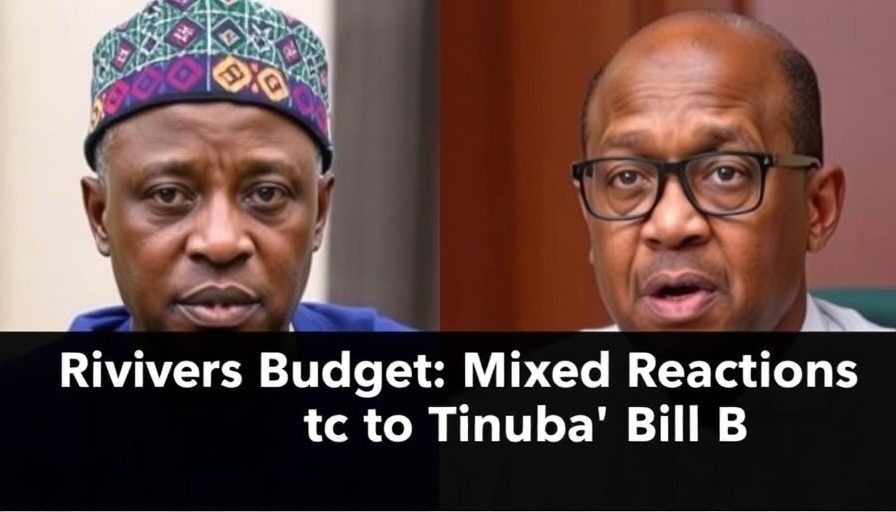
The River State Appropriation Bill: A Sign of Political Controversy
On Thursday, President Bola Tinubu formally introduced the 2025 appropriation bill for Rivers State to the National Assembly, igniting a wave of political controversy concerning governance and public representation in the state. This unprecedented move follows the suspension of both the state House of Assembly and the governor earlier in March, posing significant questions about the implications of executive overreach in Nigeria's democratic framework.
In 'Rivers Budget: President Tinubu’s Appropriation Bill Ignites Controversy,' the discussion dives into the implications of the president's decision, exploring key insights that sparked deeper analysis on our end.
Understanding the Necessity Behind the President's Action
Proponents of President Tinubu’s decision argue that it was necessary to ensure the state operates smoothly in the absence of elected leadership. As the state grapples with governance challenges, the introduction of a budget becomes vital. The National Assembly has already created a committee to oversee the affairs of the soul administrator, highlighting a commitment to maintain functionality in governance. "For us to move forward, we must have a budget because spending without a budget means recklessness," a supporter mentioned, highlighting the risks of unregulated spending.
A Closer Look at the Controversial Budget Numbers
The proposed budget amounts to a staggering 1.48 trillion naira, exceeding the 1.188 trillion naira budget originally proposed by the suspended governor by over 200 billion naira. With a quick assessment, critics are questioning the motivations behind this substantial increase. Key stakeholders are pondering—what led to the sudden inflation of the budget within just a two-month span? Was it a necessity driven by infrastructural needs or yet another case of padded figures for personal gain?
The Role of Civil Societies in Governance
Civil society organizations in Rivers State are raising red flags regarding the potential exclusion of public participation in hearing sessions about the budget. These organizations fear that decisions could be made behind closed doors, stifling the voices of the very people the government is meant to serve. Historically, public hearings in legislative assemblies have been platforms for citizens to express diverse perspectives. The absence of these discussions raises questions about how representative the new budget truly is, and whether citizens will experience a marginalization of their voices in legislative matters.
Calls for Transparency in Budget Preparation
Amidst the backdrop of increasing tension around the appropriation bill, several pressing inquiries have emerged: Who advised President Tinubu on these budgetary allocations? Who authored the bill, and what technical criteria were employed in its formulation? These questions illustrate a broader demand for accountability and transparency, essential pillars of a functioning democracy.
Historical Context of Political Suspension in Nigeria
This event is not an isolated occurrence. The suspension of elected officials and the militarization of politics are patterns seen throughout Nigerian history. Understanding this context is crucial for grasping current developments. As political landscapes shift, the need for accountability and citizen engagement becomes even more pronounced against a historical backdrop of governance crises.
Future Implications for Governance in Rivers State
The immediate future holds significant implications for Rivers State and its governance structure. Stakeholders will be watching for the implementation of this budget and its impact on local infrastructure, health services, and public welfare. The political dynamics may reshape how power is distributed within the region, potentially setting precedents to be followed or challenged in the future.
Conclusion: The Need for Engagement and Oversight
As political developments continue to unfold, it is imperative for citizens and civil society organizations to advocate for their rights to meaningful input and oversight of government actions. The appropriation bill submitted by President Tinubu presents a unique situation that requires collective vigilance and action from the populace to ensure that their interests are represented in discussions that directly affect their livelihoods. The stakes are high, and proactive engagement must be a priority for the people of Rivers State.
 Add Row
Add Row  Add
Add 


 Add Row
Add Row  Add
Add 

Write A Comment